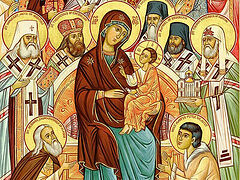Springfield, Virginia, November 27, 2024
The primate of the autocephalous Orthodox Church in America released his annual Thanksgiving Day message on Monday.
His Beatitude Metropolitan Tikhon of Washington and All America and Canada contrasts worldly happiness, which he says comes from power, control, and wealth, with Christian thanksgiving, which is deeper and more profound. He illustrates this through examples such as St. John Chrysostom, who glorified God even while dying in exile, and St. Nikolaj Velimirović, who valued his time in Dachau concentration camp as spiritually significant.
The Metropolitan explains that Christian thanksgiving isn’t about being stoic or masochistic, but rather comes from understanding human sinfulness and God’s infinite love. He teaches that through Christ’s Crucifixion, suffering itself was transformed—when endured with thanksgiving and humility, it can become a path to spiritual growth and closeness to God. This makes thanksgiving a “literal lifeline” for clinging to God during life’s difficulties.
The letter concludes by acknowledging that while it’s appropriate to be thankful for life’s good things like family and prosperity, Christians should strive for a deeper thanksgiving that sees all circumstances—even difficult ones—as opportunities for salvation. He quotes a meditation from St. Seraphim of Vyritsa that everything, including hardships, comes from God for the soul’s perfection, leading to the conclusion, “Glory to thee, O God, for all things!”
Read His Beatitude’s full message:
To the Clergy, Monastics, and Faithful of the Orthodox Church in America,
My Beloved Children in the Lord,
First of all, to my flock in the United States of America, I wish you a happy Thanksgiving!
The world around us believes—and always has believed—that happiness comes through power, through control, through wealth. The world teaches us that happiness is born of the ability to satisfy one’s own desires.
In the Church, however, we know a greater happiness, the happiness of thanksgiving. This does not mean giving thanks just for the things that we enjoy, the things that appeal to us, the things that satisfy our appetite and our self-conceit. Christian thanksgiving is the thanksgiving of St. John Chrysostom, who, dying in exile, unjustly persecuted, far from friends and homeland, departed this mortal life with the words: “Glory to God for all things!” Christian thanksgiving is the thanksgiving of St. Nikolai Velimirovic, who spoke of his time in Dachau concentration camp thus: “If it were possible, I would give the remainder of my life for one hour in Dachau.”
These are not expressions of masochism or stoic indifference, but rather expressions of thanksgiving born of true Christian experience, proceeding from a profound knowledge of man’s sinfulness and God’s infinite love. Because Christ, mounting the Cross, took on all the suffering caused by our sin in order to defeat sin and its ultimate consequence—death—suffering is forever transformed. When we suffer with thanksgiving, humility, and repentance, suffering relieves our sins and brings us near to God himself. More than this, suffering is the path beyond suffering, the path to life and resurrection.
Thanksgiving, the exclamation “Glory to God for all things,” has thus become a literal lifeline—this is how we cling to God amidst all the adverse circumstances of life. Then, even darkness becomes light, and bitterness becomes sweet, and the worst consequences of our sins become a pathway back to God. In this way, thanksgiving proves itself to be a power beyond any worldly power, a joy and nearness to God that is untouchable by any authority or means in this world.
Therefore, even as we give thanks for family, friends, for prosperity, for life’s simple joys—for God is the Giver of all these good things, too—let us also strive toward the truly Christian thanksgiving of the saints, the thanksgiving that recognizes all things as sent down from on high for the sake of our salvation.
As the Lord says to every Christian soul in the famous samizdat meditation attributed to St. Seraphim of Vyritsa: “Know and remember always, no matter where you are, that whatsoever hurts will be dulled as soon as you learn in all things to look at me. Everything has been sent to you by me for the perfection of your soul. All these things were from me.”
And because all things are from the Lord, therefore, we can truly and joyfully declare: “Glory to thee, O God, for all things!”
Once again, to all those who celebrate today’s holiday, happy Thanksgiving!
Follow OrthoChristian on Twitter, Vkontakte, Telegram, WhatsApp, MeWe, and Gab!




